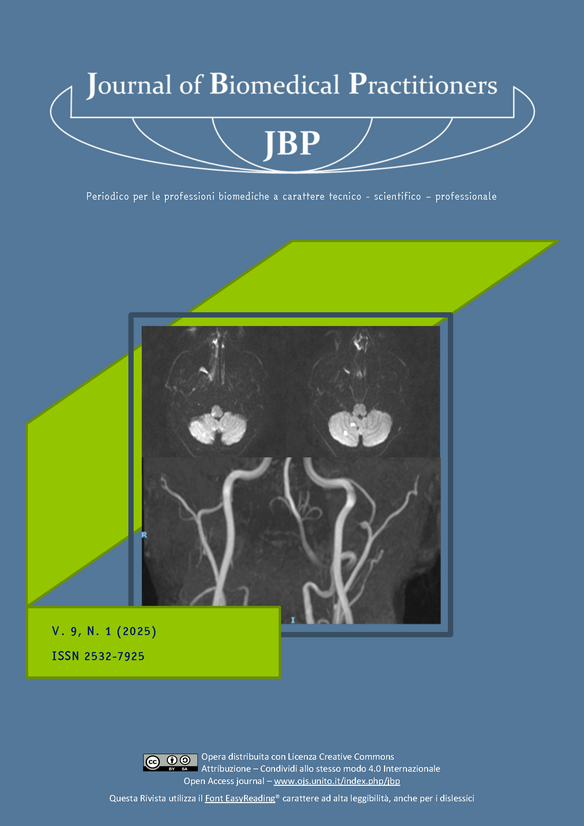Survey on Counseling and Nutritional Counseling among nutrition professionals in particular and healthcare professionals in general.
Main Article Content
Abstract
INTRODUCTION AND OBJECTIVE
the article considers health and nutrition professionals and their relationship with Counseling with a particular focus on Nutritional Counseling. The objective is to explore and evaluate the knowledge, to date, regarding Counseling and Nutritional Counseling, of nutrition and health professionals; to identify a possible significant difference between the two groups of professionals considered. In addition, the opinion of the above-mentioned will also be explored regarding the usefulness of Nutritional Counseling in certain areas of the clinic such as the treatment of metabolic diseases, Nutrition and Nutrition Disorders and the improvement of the sports performance of athletes, both competitive and amateur.
MATERIALS AND METHODS
The data were collected through a questionnaire administered to health and nutrition professionals via telematics (Whatsapp, Mail, social network). The results were analyzed by means of a Mann-Whitney statistical test.
RESULTS
The sample collected was composed of 54 participants: Dieticians (42.6%), Nutritionist Biologists (14.8%), Medical Nutritionists (1.9%) and health professionals not experienced in nutrition (40.7%). 94.4% gave the correct definition of Counseling and 61.1% believe there is a difference between this and Nutritional Counseling. The analysis shows that 91% of the population studied has average knowledge of Counseling and Nutritional Counseling.
DISCUSSION AND CONCLUSION
our survey has highlighted the need for professionals to deepen the subject, to increase awareness in the use of techniques that characterize Counseling and Nutritional Counseling.
The data highlights the need for future studies that will deepen the results involving further branches of health professions and in more areas of Italy.
Downloads
Article Details
The authors agree to transfer the right of their publication to the Journal, simultaneously licensed under a Creative Commons License - Attribution that allows others to share the work indicating intellectual authorship and the first publication in this magazine.
References
[1] J. Beck, Cognitive behavior therapy: Basics and beyond. New York: The Guilford Press, 2011.
[2] Assocounseling, A. s. (s.d.) [Internet]. Assocounseling-definizione di counseling; 2 aprile 2011 [consultato il 22 marzo 2024]. Disponibile all’indirizzo: https://www.assocounseling.it/counseling/definizione-di-counseling.asp
[3] E. Oliveri, F. Scaramelli, Piccolo manuale di Counseling Nutrizionale. Venezia: Onda d'Urto Edizioni; 2019.
[4] Agostini S. Buti G. et al – International Dietetics and Nutrition Terminology - Un linguaggio condiviso per la pra-tica professionale – ANDID - Italgraf s.r.l. 2014
[5] Officina di Counseling Nutrizionale [Internet]. Cos'è il Counseling Nutrizionale; 11 novembre 2019 [consultato il 25 marzo 2024]. Disponibile all’indirizzo: https://www.officinacounselingnutrizionale.it/notizie/cos-il-counseling-nutrizionale-hyy3j
[6] Mitchell L.J., Ball L.E., Ross R.J., et al. Effectiveness of Dietetic Consultations in Primary Health Care: A Sys-tematic Review of Randomized Controlled Trials. J Acad Nutr Diet. 2017 Dec;117(12):1941-1962. doi: 10.1016/j.jand.2017.06.364. Epub 2017 Aug 19.
[7] Volkert D., Beck A.M., Cederholm T., et al. ESPEN guideline on clinical nutrition and hydration in geriatrics. Clin Nutr. 2019 Feb;38(1):10-47. doi: 10.1016/j.clnu.2018.05.024. Epub 2018 Jun 18.
[8] National Collaborating Centre for Mental Health (UK), Eating Disorders: Core Interventions in the Treatment and Management of Anorexia Nervosa, Bulimia Nervosa and Related Eating Disorders. Leicester (UK): British Psycho-logical Society (UK); 2004. National Institute for Health and Clinical Excellence: Guidance. PMID: 23346610
[9] R.P Cant, R.A. Aroni, Exploring dietitians' verbal and nonverbal communication skills for effective dietitian-patient communication. J Hum Nutr Diet. 2008 Oct;21(5):502-11. doi: 10.1111/j.1365-277X.2008.00883.x. Epub 2008 Jul 9.
[10] Spencer L, Rollo M, Hauck Y, MacDonald-Wicks L, Wood L, Hutchesson M, Giglia R, Smith R, Collins C., A random-ised control trial comparing lifestyle groups, individual counselling and written information in the management of weight and health outcomes over 12 months. JBI Database System Rev Implement Rep. 2015 Jan;13(1):88-98. doi: 10.11124/jbisrir-2015-1812.PMID: 26447010
[11] Stonerock G.L. e Blumenthal J.A., Role of Counseling to Promote Adherence in Healthy Lifestyle Medicine: Strat-egies to Improve Exercise Adherence and Enhance Physical Activity. Prog Cardiovasc Dis. 2017 Mar-Apr;59(5):455-462. doi: 10.1016/j.pcad.2016.09.003. Epub 2016 Sep 14
[12] A. Bandura, Social Learning Theory. Indianapolis: Pearson College Div; 1976.
[13] J.V. Prochaska, The transtheoretical model of health behavior change. Am J Health Promot. 1997
[14] F. Leonardi e F. Tinacci, Manuale di Psicoterapia strategica. 80 tecniche di intervento. Treno: Erickson. 2021

